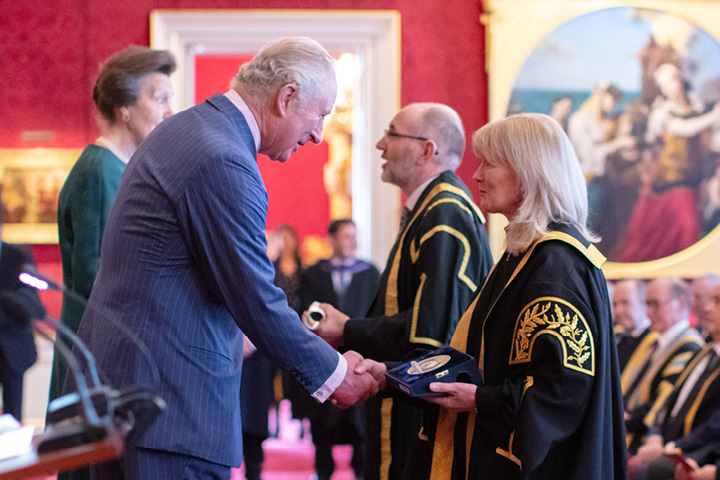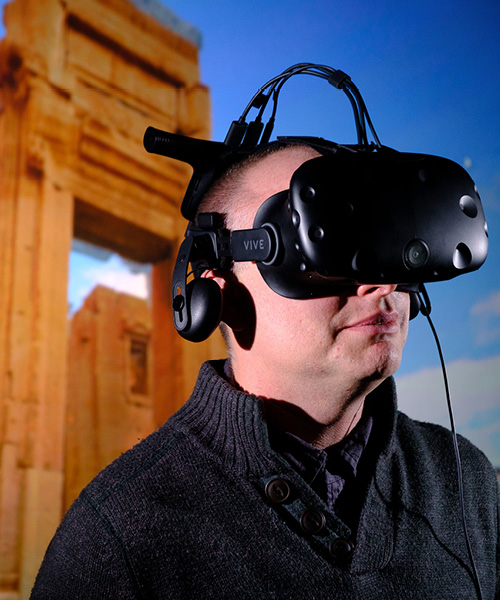Continuing Bonds is a collaboration between the University’s archaeologists, health care/nursing and psychologists to use archaeology to enable productive conversations about death, dying, and loss. It focuses on ‘continuing bonds’ with the dead, to have meaning and significance in the lives of the living.
About the prize
The Queen’s Anniversary Prizes recognise outstanding work by UK colleges and universities that shows quality and innovation and delivers real benefit to the wider world and public through education and training. The Prizes are the highest national Honour awarded in UK further and higher education. Prizes are granted by the Queen every two years.
The University of Bradford has been awarded a Queen's Anniversary Prize for Higher and Further Education for its world-leading work and innovation in developing archaeological technology and techniques and its influence on practice, policy and society.

Professor Shirley Congdon and Professor Chris Gaffney receiving the Queen's Anniversary Prize 2021 from Prince Charles and Princess Anne.
Our winning entry
The University has pioneered the development and deployment of new archaeological technology and techniques, influencing and shaping policy and practice worldwide. It is expanding thinking and approach, enabling new ways to visualise landscapes and artefacts.
The University’s excellence is underpinned by its globally significant discoveries and its reshaping of fundamental knowledge, enabling new narratives to be built. It is moving on the concept of archaeology to one of heritage and an unbroken bond with our pasts that is shaping our futures.
We are enabling the virtual and real rebuilding of heritage destroyed by conflict and natural disaster. We are using heritage to improve the quality of life and social cohesion of displaced peoples. We are shaping teaching and ethical research, informing estate management and boosting economic activity. We are providing a framework for personal growth and reshaping approaches to mortality and enabling professional development in clinical practice.

Temple of Bel (Palmyra, Syria)

We are extremely honoured to be awarded The Queen’s Anniversary Prize for our achievements in leading the development of archaeological practice, and delivering tangible scientific, economic and societal impact.
Showcasing our winning projects
The Queen’s Anniversary Prize recognised the University’s excellence and leadership in archaeology across a number of projects, from the virtual rebuilding of ancient monuments to supporting displaced people in the Middle East. We will be putting the spotlight on each of these projects.
The Stonehenge Hidden Landscapes project literally turned its back on the stones and realised that they stood in a vast area that had to provide context for the monument. The team scaled up its approach to cover an area of 26.2 square kilometres, and applied techniques that it had developed over several years.
The University’s archaeological research not only continues to open further the window on the past but is having a direct impact on societies and people now and for the future. These include Augmenting Jordanian Heritage and the BReaTHe projects in Jordan.
The Curious Travellers project has combined archaeological data with a resource that exists in abundance – the pictures of millions of tourists and locals worldwide. Together, these resources have created 3D models of ancient monuments and sites, placing them in their context and providing a legacy.
Our 2015 award
The University of Bradford won a Queen's Anniversary Prize for Higher and Further Education in 2015, its first, for world-leading work to improve the lives of people living with dementia.
The University was honoured for its leadership in developing person-centred dementia care, and for influencing policy and practice in the UK and internationally.
The University’s research has been central to the transformation of care for people affected by dementia. Bradford’s role and impact is based on sustained excellence, spanning research and high-quality teaching and learning, with an unmatched record of engagement with care providers, regulators, and people with dementia and their families.
Bradford’s work in dementia care has had outstanding impact, reaching a wide range of care settings in the UK and beyond, including working with care providers and national bodies on new approaches to developing a highly skilled workforce, and measuring the quality of care.

Professor Murna Downs and Professor Brian Cantor collect the Queen's Anniversary Prize 2015 from the Prince of Wales and the Duchess of Cornwall.
Study archaeology
Our undergraduate and postgraduate students are involved in astonishing discoveries. Find out more about our archaeology, forensic sciences, and heritage and archaeology courses.

